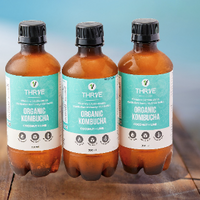Kombucha is a fermented tea beverage made from sweetened tea (usually black or green) fermented with a symbiotic culture of bacteria and yeast. The fermentation process gives kombucha its distinctive tangy flavour and carbonation.
- Potential Health Benefits of Kombucha Probiotics: The fermentation process produces probiotics, beneficial bacteria that can support gut health. Probiotics may aid digestion, boost the immune system, and reduce inflammation.
- Antioxidants: Kombucha, especially when made with green tea, contains
- antioxidants which can help fight free radicals in the body. This may help reduce the risk of certain chronic diseases.
- Detoxification: Kombucha contains glucuronic acid, which may aid the body's natural detoxification processes by binding to toxins and helping to eliminate them from the body.
- Improved Digestion: The acetic acid and other acids produced during fermentation can promote healthy digestion and may prevent the growth of harmful bacteria in the gut.
- Potential Heart Health Benefits: Some studies suggest that kombucha can help manage cholesterol levels and blood sugar, both of which are important for heart health.
- Organic Ingredients: Made with tea, sugar, and other flavorings that are certified organic. This means they are grown without synthetic pesticides, herbicides, or genetically modified organisms (GMOs).Purity: Less likely to contain pesticide residues or other chemicals.Higher Standards: Often adhere to stricter production standards, ensuring that no synthetic additives or preservatives are used.
- Health Benefits: Potentially Lower Chemical Exposure: Reduced risk of consuming residues from synthetic chemicals.Nutrient Density: Organic farming practices can sometimes result in higher nutrient levels in ingredients, although this varies.
- Environmental Impact:Sustainable Practices: Organic farming typically emphasizes sustainable and environmentally friendly practices, such as soil health, water conservation, and biodiversity.
- Reduced Pollution: Less reliance on synthetic chemicals helps reduce pollution and environmental degradation.
- Higher Price: Organic kombucha is generally more expensive due to the higher costs of organic farming and certification.
Non-Organic Kombucha Ingredients and Production:
- Conventional Ingredients: May use conventionally grown tea, sugar, and flavourings, which can involve synthetic pesticides, herbicides, and GMOs.
- Flexibility in Ingredients: Wider range of available ingredients, which can include some that are not available organically.
- Quality Varies: Quality and safety can vary widely among non-organic brands.
- Environmental Impact: Conventional Farming Practices: Often involves the use of synthetic chemicals, which can lead to environmental issues such as soil degradation, water contamination, and reduced biodiversity.
- Lower Price: Typically less expensive than organic versions due to lower production costs and fewer regulations.





















